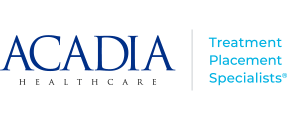Acadia Healthcare provides comprehensive drug and alcohol detoxification services at numerous treatment facilities within our network. In a safe and comfortable setting, patients will have the necessary supervision and support as they take the next steps toward sustainable recovery from drug or alcohol addiction.
Understanding Addiction
The term detoxification refers to the removal of toxins from a person’s body. In the realm of addiction treatment and recovery, detoxification is the process through which a person rids his or her body of alcohol and other drugs. Also referred to as detox, this process can be critical in the effort to overcome chemical dependency.
When a person gets addicted to a substance, they develop a tolerance, which means that it takes more of that substance to achieve a desired effect. Tolerance of a substance can quickly lead to an addiction. After a person becomes addicted to a substance and ceases use of the substance, their body will signal a variety of distressing physical and psychological symptoms. This process is known as withdrawal, and will vary depending on several factors, including the type of substance the individual has been using, the amount of that substance they’re ingesting, and the length of time they have been using.
The withdrawal process can be a painful one. Some common withdrawal symptoms include powerful cravings for the substance, twitches and tremors, nausea, vomiting, diarrhea, agitation, mood swings, depression, insomnia, abdominal pain, and muscle and bone pain. Sometimes, those who undergo withdrawal may experience hallucinations, delusions, and seizures. Because the withdrawal process can be difficult, painful, and sometimes dangerous, often it is best to cease use of a substance under clinical care and guidance. Seeking professional detox may be the wisest choice you can make, both for your mind and your body.
Why Consider Treatment for Addiction
Acadia Healthcare offers a wide variety of addiction treatment facilities that offer detoxification services. In our treatment facilities, detox is a closely supervised process where individuals can rid their bodies of toxins in a safe and stable environment. Often referred to as medically monitored detox, this process takes place in a clinical setting where experienced professionals can help alleviate the distressing symptoms that often accompany withdrawal. With the help of clinically trained and compassionate staff, you can undergo detox alongside a team that supports you and your unique journey to recovery.
The detox process typically lasts anywhere between three to five days, though this varies depending on personal factors. When an individual receives detox services at an Acadia treatment facility, they not only receive superior care throughout the process, but they can also transition directly into inpatient or a lower level of care once detox is completed.
At treatment facilities within the Acadia Healthcare network, detox begins with a psychosocial assessment where a team of professionals will evaluate an individual’s personal and family history as related to their substance use, along with their previous treatment experiences and their current physical and psychological health. The psychosocial assessment allows our team to develop a customized detox plan for the individual, and it also provides the treatment team with data and insights into how to best craft a personalized comprehensive treatment plan to guide the individual’s post-detox care.
Levels of Care Offered Through Acadia Healthcare
The following are among the many benefits of participating in detox at one of Acadia’s many addiction treatment facilities:
- The individual will remain in a safe, stable environment throughout their treatment process. This includes round-the-clock care and supervision by experienced professionals.
- The individual will not have access to any illicit substances.
- The individual will have continuous support throughout their time in detox, and will be working with professionals who have specific expertise in treating the physical and psychological symptoms of withdrawal.
- Depending on the individual’s particular detox process, they may be able to participate in the therapeutic components of their treatment plan while still in the detox environment.
- After the individual has successfully completed detox, they can transition directly into residential treatment or another level of care, which will significantly increase their likelihood for achieving long-term recovery and will reduce the risk of relapse.
Depending upon the individual’s medical history, the nature and severity of their addiction, and the protocols of the specific program, detox may include the administration of certain medications designed to ease physical and psychological distress. For example, symptoms of opioid withdrawal may be alleviated with medications such as methadone, Subutex, and Vivitrol. Meanwhile, benzodiazepines can help with alcohol withdrawal.
At Acadia Healthcare, we take seriously the detoxification process and are committed to providing our patients with a safe, comfortable, and feasible detox experience. We are well aware of the challenges involved in overcoming drug and alcohol addiction, and we respect the courage of each individual who chooses to heal with us. If you decide to seek treatment at one of Acadia’s premier treatment facilities, you will reap the benefits of clinically excellent care, compassionate staff, and a consistent dedication to your comfort and safety. We offer you a seamless transition into treatment following your detox experience, and will assure your treatment is catered to meet your individual needs.
Learn More
To learn more about detox, or for answers to any questions you may have about the services we offer, please reach out to an Acadia facility near you. We look forward to providing you with the information you need to make an informed decision about the next steps of treatment for you or a loved one.






